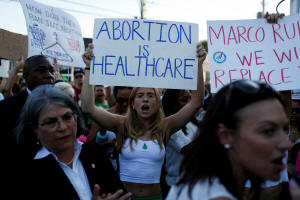U.S. Justice Dept launches task force to protect women's reproductive
rights
 Send a link to a friend
Send a link to a friend
 [July 13, 2022]
By Sarah N. Lynch [July 13, 2022]
By Sarah N. Lynch
WASHINGTON (Reuters) -The U.S. Justice
Department on Tuesday unveiled a new task force that aims to protect
women's reproductive healthcare freedom, after the Supreme Court last
month overturned the landmark 1973 Roe v. Wade ruling which recognized
women's constitutional right to abortion.
The task force, which will be chaired by Associate Attorney General
Vanita Gupta, will monitor and evaluate state legislation and
enforcement actions that threaten to "infringe on federal legal
protections" related to reproductive healthcare, the department said.
It will also monitor laws that seek to ban Mifepristone, one of the two
drugs often used to end an early-stage pregnancy, based on disagreements
with the Food and Drug Administration's "expert judgment about its
safety and efficacy," the department said.

The Supreme Court's 6-3 ruling on June 24 has sent legal shock waves
across the country, with 26 states either certain to or considered
likely to ban abortion.
Some of the anti-abortion bills, meanwhile, also could potentially
criminalize the practice or make it harder for women to travel out of
state for the procedure.
[to top of second column]
|

An abortion rights protester holds a sign as she demonstrates after
the U.S. Supreme Court ruled in the Dobbs v Women’s Health
Organization abortion case, overturning the landmark Roe v Wade
abortion decision in Miami, Florida, U.S. June 24, 2022.
REUTERS/Marco Bello/File Photo

The Justice Department said the task force will also
monitor any laws that "impair women's ability" to seek care in
states where it is legal.
Although abortion is the focus of many state laws, reproductive
healthcare advocates have warned that some of these bills could have
far wider-reaching implications for women's health beyond the
procedure itself.
Some of the state bills, for instance, recognize "personhood" from
the moment of fertilization, a definition that could hamper in vitro
fertilization treatments in which doctors collect and fertilize a
woman's eggs in hopes of finding a viable embryo for transfer into
her uterus.
Experts have also warned the ruling could lead to other barriers to
accessing healthcare, including specific types of contraception such
as intrauterine devices.
(Reporting by Sarah N. Lynch in WashingtonEditing by Matthew Lewis)
[© 2022 Thomson Reuters. All rights
reserved.]
This material may not be published,
broadcast, rewritten or redistributed.
Thompson Reuters is solely responsible for this content. |